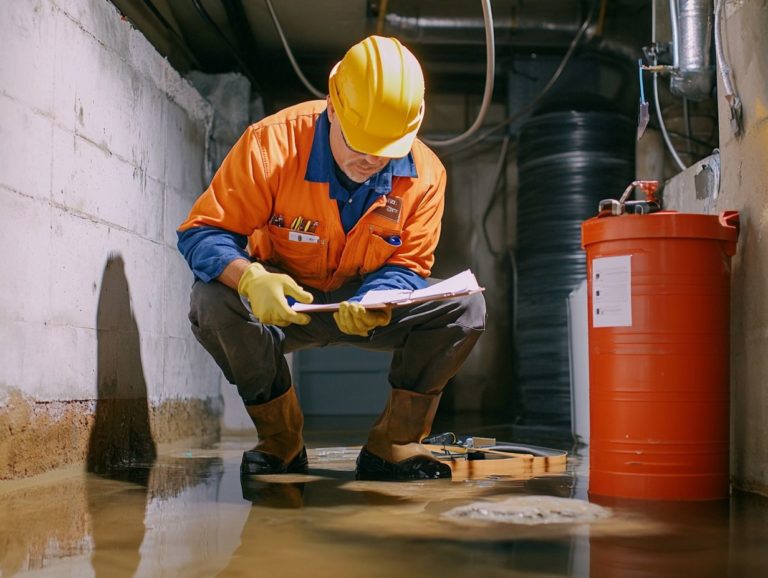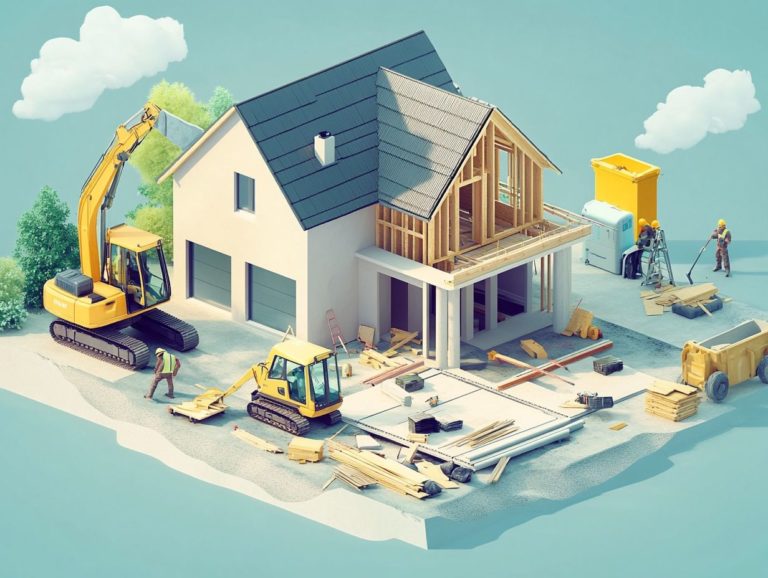Pros and Cons of Home Inspections for Buyers
Buying a home is likely one of the most significant investments you’ll ever make, and understanding its condition is essential.
A home inspection is a critical step in the buying journey, allowing you to uncover potential issues and granting you peace of mind. This article delves into the details of home inspections, weighing the pros and cons for you as a buyer, while also offering guidance on when and how to schedule one!
You’ll find tips on selecting a qualified inspector, along with insights into what to expect during the process. Immerse yourself in this information to make informed decisions for your future home!
Contents
Key Takeaways:

Home inspections provide valuable information about the condition of a property, helping buyers make informed decisions about their investment. However, they can also have limitations, such as potential delays and additional costs. Understanding the importance of home inspections for property buyers is crucial, as factors such as the age, location, and type of property should be considered before scheduling a home inspection.
What is a Home Inspection?
A home inspection is an intricate assessment of a property’s condition, typically carried out by a qualified inspector. It serves a pivotal role in the home buying journey, revealing safety concerns, concealed issues, and unauthorized modifications that could influence the property s market value. This detailed evaluation empowers you to make informed decisions, safeguarding your investment by uncovering potential deal-breakers and substantial repairs that might affect your financial commitment and closing timeline.
Definition and Purpose
The definition and purpose of a home inspection encompass a thorough evaluation of a property, aimed at uncovering its current condition and any existing issues. This process provides you with essential insights as a prospective buyer. Enhancing your awareness as a buyer is crucial, as it empowers you to make informed decisions about one of life’s most significant investments.
During the inspection, a qualified inspector evaluates various elements of the home, including the structure, roof, plumbing, electrical systems, and HVAC units. The detailed assessment report generated from this evaluation addresses major components, outlining any maintenance concerns or necessary repairs. This information allows you to negotiate better deals or even reconsider your purchase if significant issues surface.
Ultimately, the home inspection serves as a safeguard, ensuring that you are fully informed about the property’s condition before finalizing your purchase.
Pros of Home Inspections for Buyers
Home inspections offer you a wealth of advantages, acting as your safeguard against safety issues and hidden problems that might lead to unexpected costs or complications down the road. Understanding the benefits of home inspections for sellers can help you protect your investment!
In a competitive seller s market, this process becomes an invaluable negotiating tool. By revealing potential repairs and providing insight into the property’s condition, you empower yourself to make informed decisions that reflect your financial commitments and align with your long-term investment goals.
Benefits of Knowing the Condition of a Property
Understanding the condition of a property through a home inspection equips you with vital knowledge that can greatly impact your purchasing decisions. By uncovering details about the structural integrity, electrical systems, plumbing, and even the potential presence of mold or pests, you can evaluate the benefits of a home inspection against any identified risks.
This awareness enables you to determine how much you’re willing to invest and whether you need to set aside funds for repairs or renovations. Ultimately, a thorough inspection can unravel the details of buying a home, empowering you to make informed offers and negotiate terms that accurately reflect the true value and condition of the property, thereby maximizing your investment.
Cons of Home Inspections for Buyers

While home inspections provide invaluable insights, understanding the importance of a home inspection for buyers also means acknowledging their limitations and drawbacks that you should carefully consider.
For instance, an inspection report may suggest repairs that aren’t crucial for the property’s overall health and could lead to unnecessary expenditures. Additionally, inspection requirements vary widely, and typical costs might affect your financial commitment, particularly in a competitive property market where every cent counts.
Schedule your home inspection today to safeguard your investment!
Possible Limitations and Drawbacks
Possible limitations and drawbacks of a home inspection could include the risk of buyer’s remorse if the inspection report uncovers too many issues or suggests unnecessary repairs. Understanding the importance of home inspections for buyers can help mitigate these feelings of overwhelm and doubt about the property’s overall value.
The subjective nature of inspections means that one inspector may focus on different factors than another, resulting in varying reports. This inconsistency can create confusion, as potential biases whether stemming from personal opinion or a lack of experience might skew the assessment of significant problems.
As a result, these issues can shake your confidence, making it essential to approach the inspection process with an open mind and a solid grasp of its complexities.
When to Consider a Home Inspection
Considering a home inspection is important at several key stages of your property-buying journey. This is especially true when you factor in elements like the property’s market visibility, upcoming closing timelines, and the importance of understanding the home inspection process for buyers to protect your interests.
Recognizing the optimal time to schedule an inspection can greatly impact your negotiation strategy and, ultimately, your investment decision.
Factors to Consider Before Scheduling an Inspection
Before scheduling a home inspection, consider factors such as potential closing costs and the current state of the real estate market, as these can significantly influence the negotiation process.
Buyer interest often fluctuates with seasonal trends, affecting how quickly you should arrange inspections. In a competitive market, for instance, securing a timely inspection can give you an edge in negotiations, making it easier to address necessary repairs or adjust the asking price.
Conversely, in a buyer’s market, you can take advantage of flexible scheduling to gather more information and evaluate various properties without the pressure of immediate commitments.
By understanding these dynamics, you ll be better equipped to make informed decisions and navigate your home-buying journey with confidence.
Tips for Choosing a Home Inspector
Selecting a qualified home inspector is crucial for ensuring that the inspection services align with your needs as a buyer and adhere to industry standards. This choice significantly boosts your confidence in the overall assessment process.
The right inspector can deliver not only a precise report on the property’s condition but also valuable insights that can serve as a formidable negotiating tool in your transactions.
What to Look for in a Qualified Inspector

When you re searching for a qualified home inspector, it s essential to weigh their experience, certifications, and commitment to industry inspection standards. These elements significantly influence the thoroughness and reliability of the inspection process.
An inspector with years of hands-on experience is more likely to spot potential issues that a less seasoned individual might miss. Verifying their certifications ensures that they are well-versed in the latest building codes and safety standards, which can greatly affect the overall assessment of your property.
Understanding their inspection approach whether they use advanced technology or innovative methods can offer you deeper insights into the home’s condition, empowering you to make well-informed decisions.
What to Expect During a Home Inspection
During a home inspection, you can anticipate a thorough evaluation of the property, focusing on major systems like plumbing, electrical, and structural integrity, which means how well the building is built.
This process provides you with valuable insights into the overall condition of the home, delivered in an assessment report that outlines essential costs and potential repairs.
It’s crucial for you to engage actively with the inspector throughout this process, asking pertinent questions that can help clarify their findings and enhance your understanding.
The Inspection Process and What to Ask
The inspection process typically includes a careful check of the property. As a buyer, you should be ready to ask essential questions about the major systems and any findings reported.
Inspectors usually start their journey by assessing the exterior, taking a close look at the roof, foundation, and landscaping. Each of these areas can provide critical insights into the property’s overall condition.
Afterward, they transition to the interior, thoroughly examining the plumbing, electrical, and heating, ventilation, and air conditioning (HVAC) systems for both functionality and safety.
As a buyer, consider asking questions like:
- “How old are the roof shingles?”
- “When was the last time the plumbing was serviced?”
Gaining an understanding of these elements and any necessary repairs is crucial for making a smart investment don t skip this step!
Frequently Asked Questions
What are the benefits of home inspections for buyers?
Home inspections provide buyers with a detailed understanding of the property’s condition they are interested in purchasing. This includes identifying any potential issues or defects, as outlined in the basics of home inspection for buyers, to help them make informed decisions and negotiate repairs or price adjustments.
Can a home inspection save buyers money in the long run?
Yes, a thorough home inspection can uncover major issues or safety hazards that may require costly repairs. By being aware of these issues before purchasing, buyers can refer to the role of home inspections for first-time buyers to negotiate with the seller to either have the repairs done or adjust the price accordingly.
Do buyers have to be present during the home inspection?
While it is not required, it is generally recommended for buyers to attend the home inspection. This allows them to ask questions and get a better understanding of any issues or concerns that arise. However, if the buyer is unable to attend, they can still review the inspection report and discuss any concerns with their agent.
Are there any specific areas of the home that should be inspected?
While every home inspection is different, some common areas that should be inspected include the roof, foundation, electrical and plumbing systems, HVAC, and any visible structural components. It is important for buyers to discuss their specific concerns with the home inspector prior to the inspection.
Do buyers need to hire their own home inspector?
Yes, it is recommended for buyers to hire their own home inspector rather than relying on the seller’s inspection. This ensures an unbiased and thorough assessment of the property, highlighting the importance of home inspections before buying. Buyers can also choose to hire specialized inspectors for areas such as pest control, radon, or mold, depending on their concerns.






